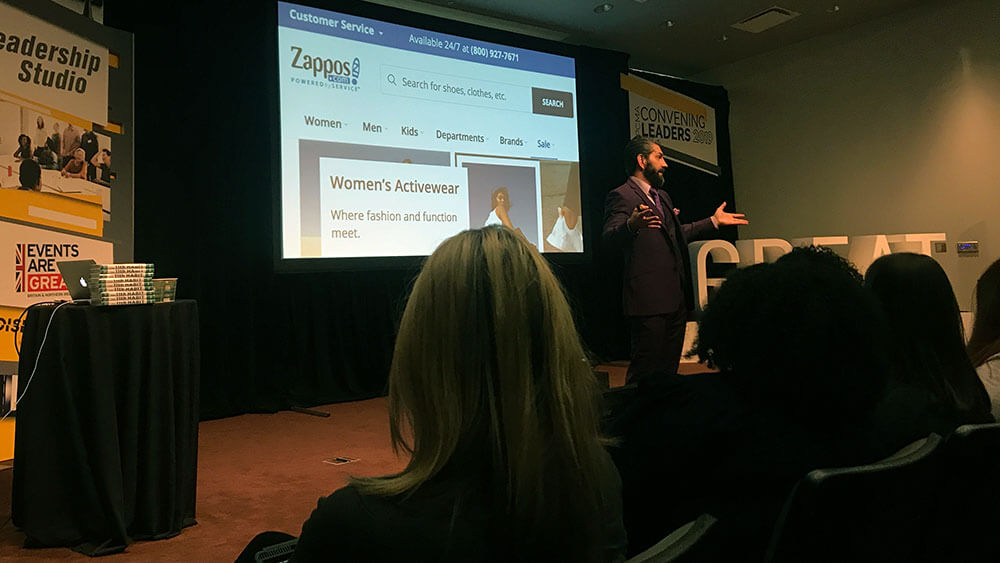
Andrew Sykes tells audience members at his Jan. 9 Convening Leaders session that events have personalities just like people. (Casey Gale)
In Andrew Sykes’ book, The 11th Habit: Design Your Company Culture to Foster Habits of High Performance, he and coauthor Hanlie van Wyk focus on the importance of human habits among employees who craft magnetic personalities, and, as a result, successful businesses. At Convening Leaders 2019, Jan. 6-9 in Pittsburgh, Sykes — entrepreneur and founder of Habits at Work — gave attendees a glimpse at four of these habits, but with a twist that zeroed-in on the personality of events.
“Our personalities, who we are at our core, is nothing more or less than the sum of the habits that we practice, and the same is true of our events,” Sykes said at his Jan. 9 session, “High Performance Habits of Magnetic Human Beings.”
“Your event has a personality. It’s like a person,” he went on. “The experience people have there is like the experience they have interacting with a person, and that experience is defined entirely by the habits of the people who organize the event, who are working at the event, the speakers of the event, the people who greet you and check you in, people in the hotels — the sum of those habits determine the experience and the personality you will have.”
Here’s a look at the four habits Sykes discussed in his presentation and how that relates to your next event.
- Deliberate Practice. Sykes said that in business positions, people tend to rely on experience — the act of performing their job over and over again — instead of practicing the tasks required to make them great at their job. Practicing is a different approach — similar to how people deliberately practice an art, such as dancing or playing the piano. Practicing is what distinguishes great performance. “Instead of saying ‘I’ve got this,’ they say, ‘I want to be great at this,’ which means they’re able to separate practice from performance. They don’t pretend that performance is practice,” he said. At meetings and events, Sykes suggested practicing greeting people, giving people directions if they are lost — “things that shape the personality of our events.”
- Give, Receive, and Use Feedback. “The golden rule of creating change in human beings is that we can’t change more than one habit at a time,” Sykes said, and the same is true for events. Sykes gave a personal example: He likes to reflect on something he did well at work, and then asks a trusted colleague what he did well at work. He then reflects on what he could do differently, and also asks the opinion of a colleague on what he could do differently. This allows him to think about his personal goals, receive feedback from others, and put internal and external feedback to use by focusing on one aspect of his performance to change. In the meetings and events world, Sykes suggests the following: Instead of sending out a post-conference questionnaire that covers a number of topics, he suggests that event staff take the time to ask attendees on site what the event is doing well and what it can do differently. There is a big difference, he said, between “asking people in the moment when it can be useful,” versus a week later when they’re gone, as many issues can be addressed in the moment.
- Ask Powerful Questions. Kimpton Hotels coaches its team on a single habit, Sykes said, by asking themselves the question: “What’s the one thing I can do right now to make this guest experience awesome?” The answer, he said, is different every time, depending on the guest and the situation. It’s not just customer-facing employees that have to answer this question, it’s managers, too, Sykes said. “What’s your question that drives the performance of your team at the event?” he asked the audience. “The one question that has your event’s personality shine through? If that question is not clear to you, my challenge to you is don’t let the year end without coming up with that question, because it is the single question that can drive the competitive advantage of your event.”
- Listen Empathetically. The idea of listening empathetically is more than listening actively, Sykes said, but listening on three levels: to what people are saying, what people are feeling, and what truly matters to people. “Below what we say, below what we feel, are the concerns we have in life,” Sykes said. “And if we can listen not only to what someone says, if we can listen for how they feel, and listen way beyond that deep down to what really matters to them and connect there, people will feel not just listened to, not just heard, but what I describe as ‘gotten.’” Sykes gave the example of online shoe retailer Zappos, which goes the extra mile by sending customers a special onesie if they hear a baby crying in the background of a customer service call, or a tennis ball if they hear a dog barking during the call. “The key habit is having your team listen,” he said, “and listen empathically, to what makes a difference to people at an event.”
